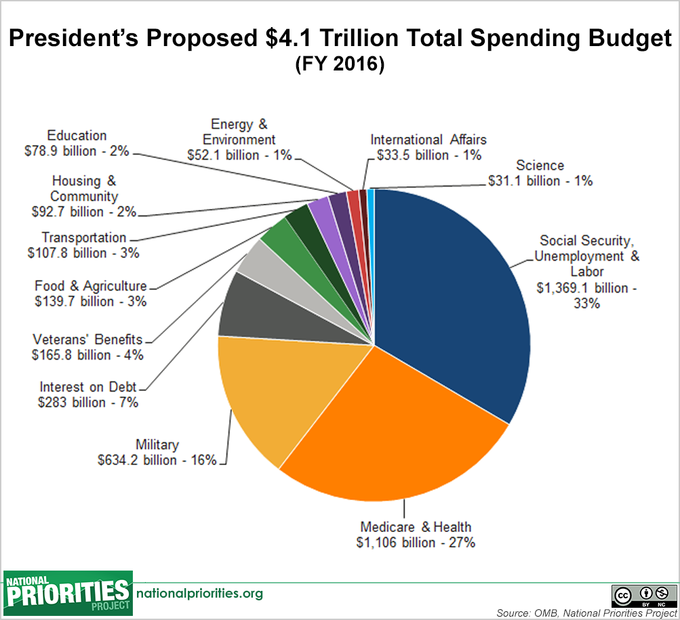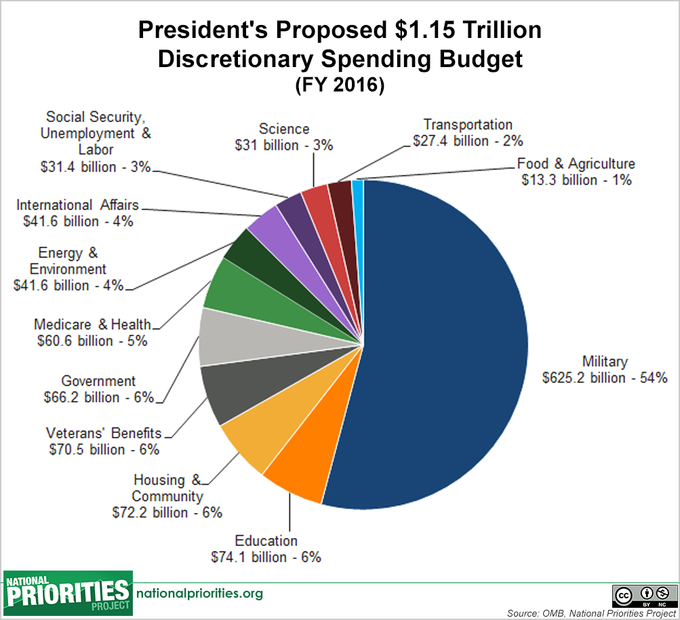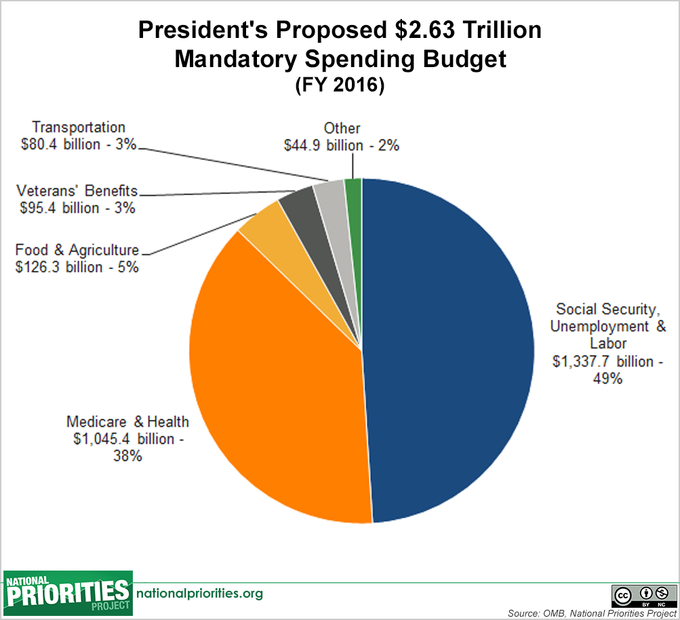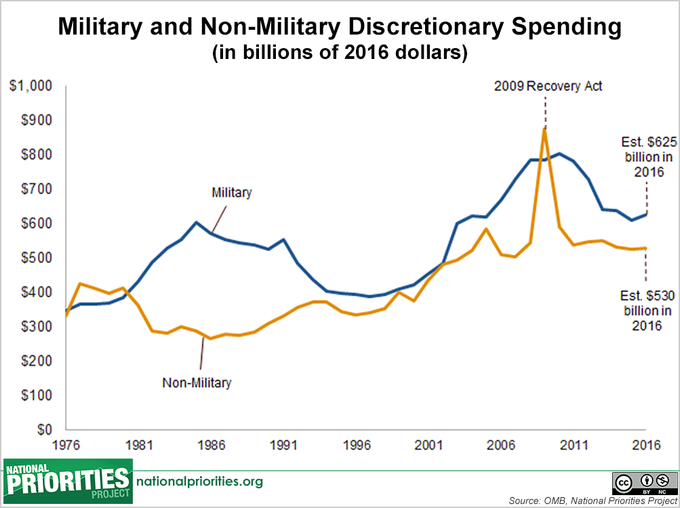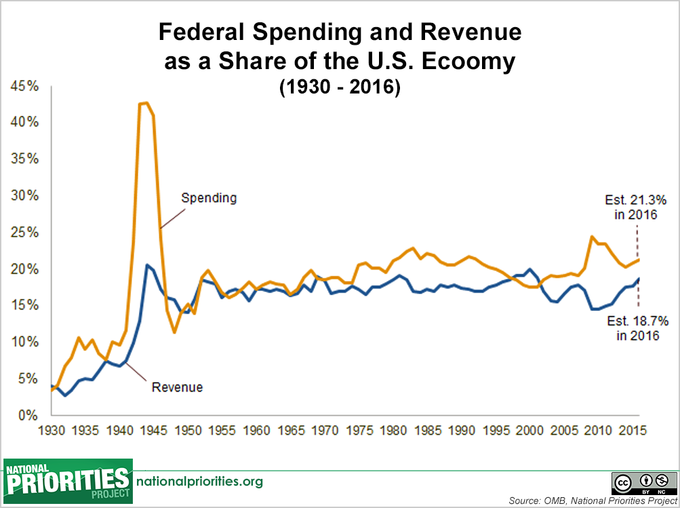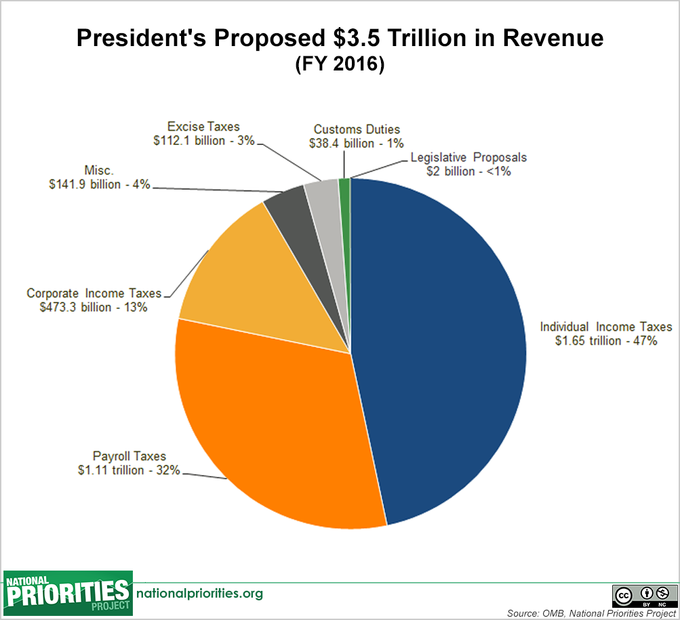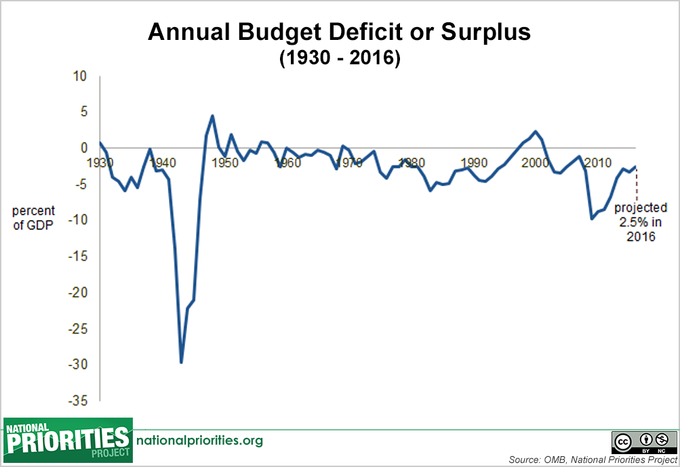For our look at budgeting in 2305.
- Click here for it.
Showing posts with label 2016 U.S. Budget. Show all posts
Showing posts with label 2016 U.S. Budget. Show all posts
Tuesday, September 20, 2016
Friday, December 18, 2015
Omnibus budget bill passes Congress, is sent to president for signature
I'll fill in details later.
The Hill: Senate sends $1.8 trillion deal to Obama.
Roll Call: Congress Sends Omnibus to Obama.
The Hill: Senate sends $1.8 trillion deal to Obama.
Roll Call: Congress Sends Omnibus to Obama.
Friday, October 30, 2015
Regarding H.R.1314 - Bipartisan Budget Act of 2015
That's the official name of the budget bill that passed the Senate last night.
- Click here for full info on the bill from congress.gov.
For background:
- National Journal: Senate Approves Budget Deal, Raises Debt Ceiling.
- Huffington Post: Senate Passes Budget Bill.
- Washington Post: Congressional leaders, White House reach two-year budget deal.- Click here for full info on the bill from congress.gov.
For background:
- National Journal: Senate Approves Budget Deal, Raises Debt Ceiling.
- Huffington Post: Senate Passes Budget Bill.
- Politico: House passes sweeping budget bill.
Here's text from the NYT:
The Senate approved a crucial bipartisan budget agreement early on Friday that would avert a government default and end nearly five years of pitched battles between congressional Republicans and the Obama administration over fiscal policy.
The measure, which was approved 64 to 35, now goes to the White House, where President Obama has said he will sign it.
“This agreement is a reminder that Washington can still choose to help, rather than hinder, America’s progress,” Mr. Obama said in a statement.
The Senate vote, held in the dead of night, was perhaps a fitting cap to the clashes between Republicans and the White House, which many warned had put the United States on the edge of economic calamity and which, in 2013, forced a16-day shutdown of the federal government.
Unlike the 2013 fight, in which Republicans ultimately surrendered and conceded defeat in trying to force a repeal of Mr. Obama’s health care law, this week’s budget accord was largely a draw.
The deal would increase spending by $80 billion over two years and raise the federal debt ceiling, averting a default that the Treasury had warned would happen early next week. It was approved in the House on Wednesday with the overwhelming support of Democrats, but with less than one-third of Republicans backing it.
Sunday, October 25, 2015
Obama Vetoes Defense Bill.
Last week in checks and balances:
The bill is officially called H.R.1735 - National Defense Authorization Act for Fiscal Year 2016. This link take you to Congress.gov's page on the bill and its process. The bill would authorize appropriations for defense for the current fiscal year. Since the year began October 1st, defense spending is covered under the continuing appropriations bill passed in late September. As 2305 students know, the bill goes back to the House and then the Senate for a possible override.
From The Hill: Obama vetoes defense bill.
The bill is officially called H.R.1735 - National Defense Authorization Act for Fiscal Year 2016. This link take you to Congress.gov's page on the bill and its process. The bill would authorize appropriations for defense for the current fiscal year. Since the year began October 1st, defense spending is covered under the continuing appropriations bill passed in late September. As 2305 students know, the bill goes back to the House and then the Senate for a possible override.
From The Hill: Obama vetoes defense bill.
Obama argues the bill irresponsibly skirts spending caps adopted in 2011 by putting $38 billion into a war fund not subject to the limits, a move he called a "gimmick." He has called on Congress to increase both defense and nondefense spending.
“Let’s have a budget that properly funds our national security as well as economic security, let’s make sure that we’re able in a constructive way to reform our military spending to make it sustainable over the long term,” Obama said.
The president also objects to language in the bill that requires the Guantanamo Bay, Cuba, military prison to remain open. Republican leaders expressed outrage with Obama’s decision to veto the bill, pointing out that it puts a scheduled pay raise for troops, among other policy changes, at risk.
“By placing domestic politics ahead of our troops, President Obama has put America’s national security at risk,” Speaker John Boehner (R-Ohio) said in a statement. “This indefensible veto blocks pay and vital tools for our troops while Iranian terrorists prepare to gain billions under the president’s nuclear deal."
The move forces Congress to revisit the bill and send it back to the president. The military will continue to operate under last year’s defense policy if lawmakers cannot reach an agreement. Republicans have pledged to attempt to override Obama’s veto, but it’s unlikely they have the votes to do so.
The Senate voted 70-27 to pass the bill, and overriding the veto would require 67 votes. But Democratic leaders have said some members would switch their vote to avoid defying the president. The House vote count, 270-156, would not be enough to override a veto, which would take 290 votes.
The NYT editorializes in favor of the veto and walks through the reasoning behind it here.
For more:
- Politico: Obama vetoes massive defense bill over budget spat.
- The Blaze: Obama Vetoes Defense Bill Over Gitmo and His Demands for More Non-Defense Spending.
For a look at the status of all the appropriations bills click here.
Thursday, October 1, 2015
From Newsweek: Senate Passes Bill to Fund Government Through December 11
On the eve of the government’s annual budget expiration, Senate passed a continuing resolution to provide temporary funding for the government through December 11. The resolution now makes its way to the House and if it is passed, a government shutdown will be avoided for the time being.
The resolution received 78 “yes” votes out of 100, though it only needed 51 to pass.
This decision comes after Cecile Richards, the leader of Planned Parenthood, testified before Congress on the matter of defunding the healthcare provider. Members of the Republican Party, including Republican presidential candidate Ted Cruz, have sought a government shutdown in order to defund Planned Parenthood after the release of controversial videos by a pro-life activist purporting to expose the illegal practices of the health organization.
Mitch McConnell, the Senate Majority Leader, harshly opposed a government shutdown, opting to temporarily fund Planned Parenthood in order to avoid such an outcome.
Congressional Republicans used these brinkmanship tactics in 2013, when Cruz gave a 21-hour marathon speech, opting for a government shutdown in protest of funding the Affordable Care Act. Democrats argued the move produced economic insecurity. With national election campaigning in full force, Republican leadership has been wary of the political dangers of a shutdown.
Tuesday, September 22, 2015
From the Hill: GOP wants budget talks with Obama — not Pelosi and Reid
- Click here for the article.
Republicans want President Obama as a negotiating partner when it comes to budget talks, something Democrats are determined to avoid. With a little more than a week to prevent a government shutdown, the GOP thinks the talks should be between them and Obama since they now have control of the House and Senate.
Losing the Senate in last year’s midterm elections should force Obama to deal with them, they say. Democrats, however, are determined to keep a seat at the table — in part because they think they’ll drive a tougher bargain than Obama, whose past efforts to make deals with Republicans unnerves Capitol Hill liberals.
In this case, Obama seems likely to go along with congressional Democrats — especially after bruising fights over trade policy and the Iran nuclear deal. But Democrats are leaving nothing to chance.
Senate Minority Leader Harry Reid (D-Nev.) and House Minority Leader Nancy Pelosi (D-Calif.) met with Obama at the White House on Thursday. At the end of the meeting, Pelosi and Reid spoke to reporters and said all agreed on their strategy moving forward. And on Monday, the White House stated its desire for Republicans to negotiate with congressional Democrats.
Wednesday, September 9, 2015
Will there be a government shutdown over funding to Planned Parenthood?
Some news sources think that is where Congress is headed. The Republican rank and file seems to angling for one, the leadership seems resistant, but that may lead to a move against them - John Boehner's speakership may be on the line
- Politico: Countdown to shutdown begins: It's not clear how Republican leaders plan to resolve the standoff over Planned Parenthood funding.
- National Journal: Republican Leaders’ Stressful September: They’ve already lost the Iran fight, and more infighting over Planned Parenthood funding awaits.
- The Atlantic: The Plot Against Planned Parenthood and John Boehner.
- Politico: Countdown to shutdown begins: It's not clear how Republican leaders plan to resolve the standoff over Planned Parenthood funding.
Congress returned from its long summer vacation Tuesday to an all-out, three-week sprint to avert a government shutdown – and no apparent plan yet to quell the conservative rebellion over Planned Parenthood that has dramatically increased the odds of a closure.
The mad dash – just 11 legislative work days left to solve the shutdown crisis, in between major votes on the Iran nuclear deal and the first-ever papal address to a joint session of Congress – presents a major test for Republican leaders in both chambers who vowed to end crisis-driven legislating.
The smart money is on Congress doing what it typically does when it’s up against a deadline: Find a short-term fix and delay the fight for later. But the dynamics are so fluid and passions high that no one truly knows how it will wind up on Sept. 30, the final day of the fiscal year and last day to extend funding or have the government close its doors.
- National Journal: Republican Leaders’ Stressful September: They’ve already lost the Iran fight, and more infighting over Planned Parenthood funding awaits.
Republican Congressional leaders are facing a stressful September, burdened with a best-case outcome of maintaining the status quo in government funding and a worst-case outcome of another government shutdown.
Adding to their headaches, a flurry of Democratic senators pledged late last week to support the Iran deal, eliminating the possibility that Congress could override a presidential veto of a resolution disapproving of the multinational deal.
And as dissatisfaction with their leadership peaks on the right, it remains unclear what consequences could arise for top Republicans in they fail to deliver on sought-after conservative demands, particularly stripping Planned Parenthood of roughly $500 million in annual federal funding.
- The Atlantic: The Plot Against Planned Parenthood and John Boehner.
It has become an annual harbinger of autumn in this era of divided government: The calendar swings from August to September, Congress returns from its long summer break, and Republican leaders try to figure out how to keep the federal lights on past the end of the month.
In 2013, John Boehner gave in to Senator Ted Cruz and his conservative allies in the House, and the government shut down for two weeks in a failed fight over Obamacare. A year ago, Boehner and Mitch McConnell succeeded in twiceputting off a losing battle over immigration until after they could wrest control of the Senate from the Democrats.
With federal funding set to expire on September 30, conservatives are once again demanding a standoff that Boehner and McConnell are hell-bent on avoiding. This time around, the issue that might prevent an orderly—if temporary—extension of funding is Planned Parenthood. Along with Cruz, House conservativesinsist that any spending bill sent to President Obama’s desk explicitly prohibit taxpayer dollars from going to the women’s health organization, which has come under fire over undercover videos that purportedly show its officials discussing the sale of fetal tissue. Democrats have rallied around Planned Parenthood, and an effort to ax its approximately $500 million in annual funding is likely to fall short, either by running into a filibuster in the Senate or a presidential veto.
Saturday, September 5, 2015
Looking ahead to the US Budgeting Process
The following page from Congress.gov lists the various appropriations bills that are waiting to be considered one Congress ends its recess. None are close to being passed.
- Click here to see them.
The U.S. Constitution does not contain the word Budget - but it does state that money cannot be drawn from the treasury with an appropriation made by Congress. That what these are. We will discus them further because the national government's fiscal year is about to end, and if these are not passed - or something called a supplemental appropriations is not passed - money cannot be drawn and affected agencies have to be shutdown.
The fiscal year starts October 1st.
For more background and relevant links:
- Wikipedia: Appropriations bill.
- Wikipedia: United States budget process.
- U.S. Budget for fiscal year 2016.
- 2015 Economic Report of the President.
- US House: Committee on Appropriations.
- US Senate: Committee on Appropriations.
- Click here to see them.
The U.S. Constitution does not contain the word Budget - but it does state that money cannot be drawn from the treasury with an appropriation made by Congress. That what these are. We will discus them further because the national government's fiscal year is about to end, and if these are not passed - or something called a supplemental appropriations is not passed - money cannot be drawn and affected agencies have to be shutdown.
The fiscal year starts October 1st.
For more background and relevant links:
- Wikipedia: Appropriations bill.
- Wikipedia: United States budget process.
- U.S. Budget for fiscal year 2016.
- 2015 Economic Report of the President.
- US House: Committee on Appropriations.
- US Senate: Committee on Appropriations.
Thursday, March 26, 2015
From the Hill: New House conservative caucus divided in budget vote
More about the divisions among House Republicans we discussed earlier this week.
- Click here for the article.
- Click here for the article.
Members of the new conservative House Freedom Caucus held a lengthy conference call Friday about whether they would stick together to support or oppose GOP leaders’ new budget strategy.
Caucus Chairman Jim Jordan (R-Ohio), who led the call, backed the new approach, which included billions more for defense. But others on the line were frustrated the plan didn’t offset any of the extra spending, according to sources on the call.
By the time the phone call ended about 40 minutes later, there still was no consensus.
The vigorous debate foreshadowed Wednesday’s vote, where Freedom Caucus members splintered over supporting a backup GOP budget crafted after defense hawks balked at the lower spending levels in the original proposal.
Twenty-six Republicans eventually voted against the leadership-backed spending plan, including six of the nine Freedom Caucus co-founders: Reps. Justin Amash (Mich.), Scott Garrett (N.J.), Tim Huelskamp (Kan.), Raúl Labrador (Idaho), Mick Mulvaney (S.C.) and David Schweikert (Ariz.).
All of those co-founders but Garrett voted against final passage of the budget.
Sunday, March 22, 2015
Each chamber of Congress introduces its version of the budget
A few weeks ago President Obama introduced his budget.
- Click here for a post related to this.
Last week Congress introduced its version. Since Republicans dominate each chamber, each version reflects their vision, but the Senate introduced a separate one than the House.
- Click here for the House version.
- Click here for the Senate version.
Here's commentary:
- Can Republicans govern? Budget 2016 could be biggest test.
- House GOP Wants to Give Pentagon a Boost.
- Obama's Budget Is Done. Now It's the GOP's Turn.
- House Republican Budget Overhauls Medicare and Repeals the Health Law.
- Budget debate puts GOP credibility on the line.
- Brawl over budget will frame 2016 presidential race.
- Click here for a post related to this.
Last week Congress introduced its version. Since Republicans dominate each chamber, each version reflects their vision, but the Senate introduced a separate one than the House.
- Click here for the House version.
- Click here for the Senate version.
Here's commentary:
- Can Republicans govern? Budget 2016 could be biggest test.
- House GOP Wants to Give Pentagon a Boost.
- Obama's Budget Is Done. Now It's the GOP's Turn.
- House Republican Budget Overhauls Medicare and Repeals the Health Law.
- Budget debate puts GOP credibility on the line.
- Brawl over budget will frame 2016 presidential race.
Thursday, February 12, 2015
A few more charts on the spending side of the US budget
To build on info related to the president's recently submitted budget:
Here's the breakdown on mandatory versus discretionary spending:
Here's the breakdown on mandatory versus discretionary spending:
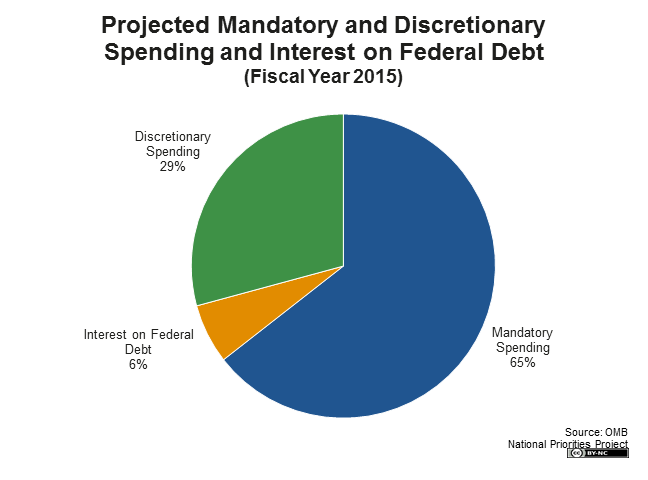
Here are the spending areas that are mandatory - meaning that they are required by law to be spent. Unless the law is changed, these areas have to be spent each year.

Here are the spending areas that are discretionary - meaning that they are not required by law and can be cut at will each year - assuming that powerful constituencies don;t get in the way.
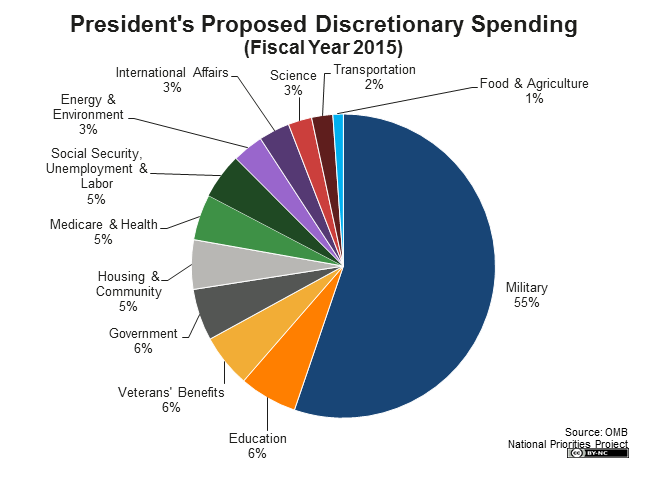

Tuesday, February 3, 2015
From the Congressional Budget Office: The Budget and Economic Outlook: 2015 to 2025
This was produced in preparation for consideration of the 2016 budget.
- Click here for it.
It provides data about recent economic performance as well as the level of outlays and revenue collection. Using economic forecasts it also - as is required by law - projects both ten years into the future. This provides guidelines for the future size of the deficit.
- Click here for the Wikipedia on the CBO.
- Click here for the CBO's website.
Here are some graphs from the report:




- Click here for it.
It provides data about recent economic performance as well as the level of outlays and revenue collection. Using economic forecasts it also - as is required by law - projects both ten years into the future. This provides guidelines for the future size of the deficit.
- Click here for the Wikipedia on the CBO.
- Click here for the CBO's website.
Here are some graphs from the report:



President Obama sends budget to Congress
2305 students will be looking through the budgetary process soon enough. To prime the pump, here's a look at the president's budget - which has just been sent to Congress.
- The President's Budget for Fiscal Year 2016.
And here's the president's message to Congress on the budget:
- Click here for it.
It builds on themes - middle class economics - introduced in the state of the union address.
And some random background and commentary:
- NYT: Obama’s Budget: Beyond the Boldness, Nuggets With G.O.P. Appeal.
- The Hill: Obama proposes $4T budget with tax hikes on the wealthy.
More detail to follow as this goes through Congress.
- The President's Budget for Fiscal Year 2016.
And here's the president's message to Congress on the budget:
- Click here for it.
It builds on themes - middle class economics - introduced in the state of the union address.
And some random background and commentary:
- NYT: Obama’s Budget: Beyond the Boldness, Nuggets With G.O.P. Appeal.
- The Hill: Obama proposes $4T budget with tax hikes on the wealthy.
More detail to follow as this goes through Congress.
Monday, February 2, 2015
The United States' budgeting process
To put our look at the recently released 2016 federal budget in context - here's a flowchart of the process.
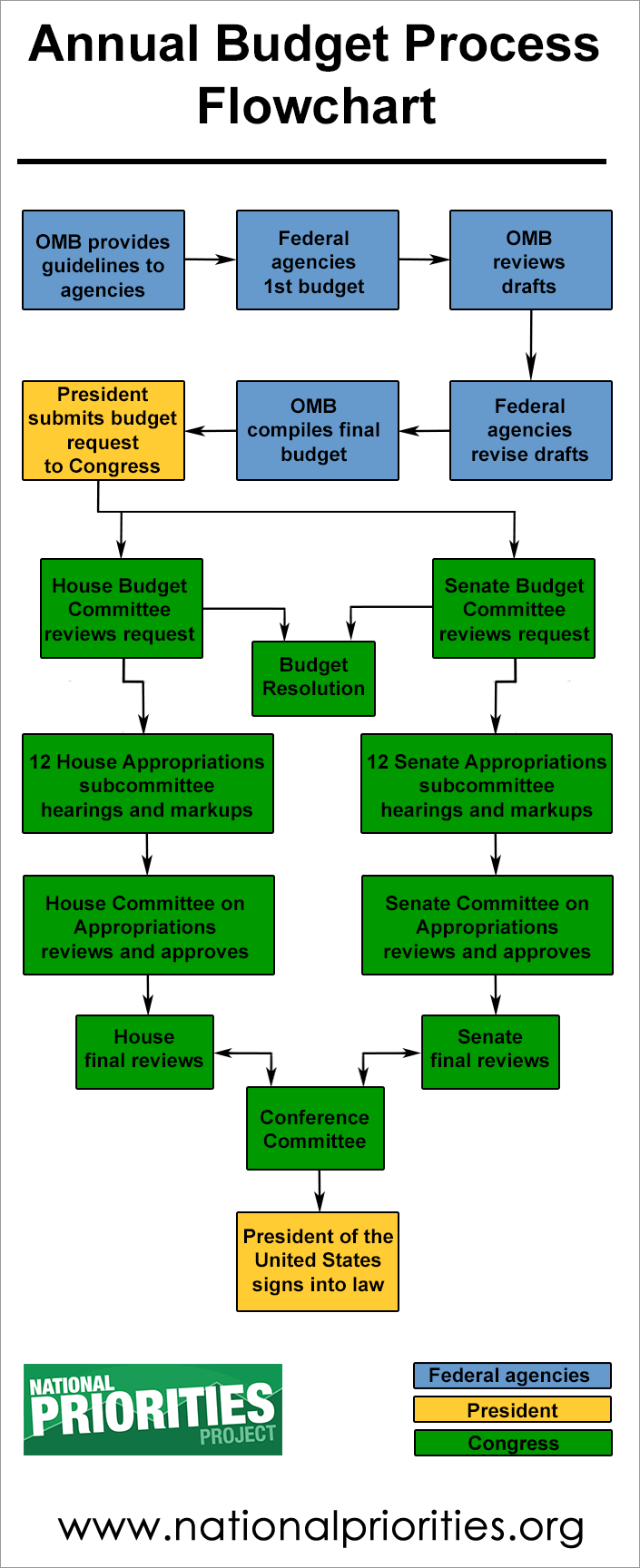
And for more detail and description:
- Wikipedia: United States budget process.
- House Budget Committee: Budget Process.
- CBPP: Policy Basics: Introduction to the Federal Budget Process.
- Wikipedia: United States budget process.
- House Budget Committee: Budget Process.
- CBPP: Policy Basics: Introduction to the Federal Budget Process.
Subscribe to:
Posts (Atom)
